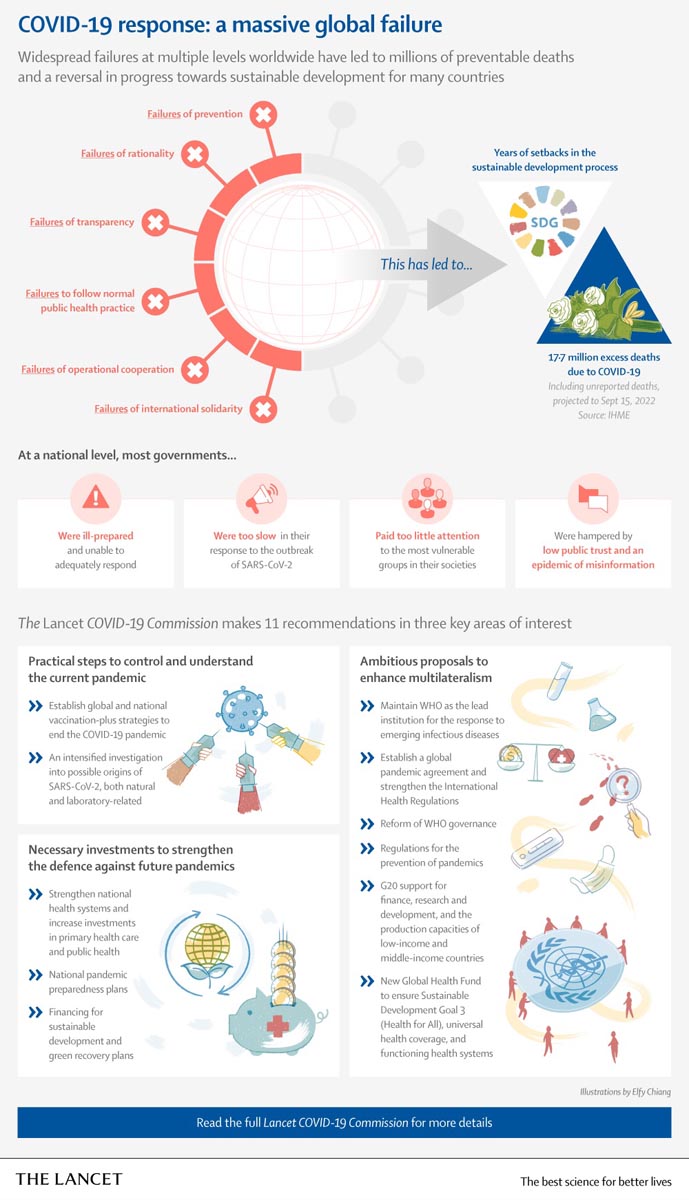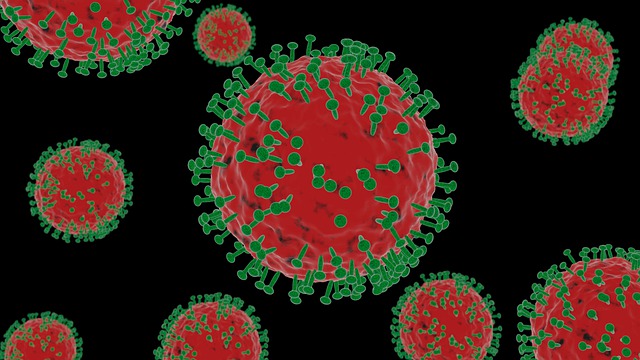The Lancet Commission on Lessons for the Future from the COVID-19 Pandemic provides comprehensive research, analysis and response to COVID-19. The Commission issues a series of recommendations that are divided into three main areas.
|
They call for better multilateral cooperation to end the pandemic and effectively manage future threats to global health
The New Lancet Commission critically considers the global response to the first two years of the COVID-19 pandemic, citing widespread failures in prevention, transparency, rationality, basic public health practices and operational cooperation and solidarity internationally resulting in approximately 17.7 million deaths (including those not reported).
The report also finds that most national governments were unprepared and too slow to respond, paid too little attention to the most vulnerable groups in their societies, and were hampered by a lack of international cooperation and an epidemic of misinformation.
World-renowned expert authors provide practical steps to ensure that COVID-19 is no longer a pandemic threat through an additional vaccination strategy and call for actions to strengthen multilateralism, along with actions to strengthen national health systems and vaccination plans. preparedness to defend against future global health threats and achieve sustainable development.

Widespread global failures at multiple levels in the COVID-19 response led to millions of preventable deaths and reversed progress made towards the UN Sustainable Development Goals (SDGs) in many countries, according to a new report from the COVID-19 Commission. 19 Lancet.
The Lancet Commission on Lessons for the Future of the COVID-19 Pandemic synthesizes evidence from the first two years of the pandemic with new epidemiological and financial analyzes to outline recommendations that will help accelerate the end of the COVID-19 pandemic emergency. ongoing, reduce the impact of future health threats and achieve long-term sustainable development.
The report warns that achieving these goals depends on strengthened multilateralism that must focus on a reformed and strengthened World Health Organization (WHO), as well as refined investments and planning for national pandemic preparedness and strengthening the health system. health, with special attention to populations in vulnerable situations. . Crucial investments also include improved technology and knowledge transfers for health commodities and improved international health financing for resource-limited countries and regions.
The Commission is the result of two years of work by 28 of the world’s leading experts in public policy, international governance, epidemiology, vaccinology, economics, international finance, sustainability and mental health, and consultations with more than 100 contributors to 11 global tasks.
"The staggering human cost of the first two years of the COVID-19 pandemic is a profound tragedy and a massive social failure on multiple levels ," says Commission Chair Professor Jeffrey Sachs, a university professor at Columbia University ( USA) and President of the Sustainable Development Solutions Network: “We must face hard truths: too many governments have not adhered to basic standards of institutional rationality and transparency; Too many people have protested against basic public health precautions, often influenced by misinformation; and too many nations have failed to promote global collaboration to control the pandemic.”
He continues: “Now is the time to take collective action that promotes public health and sustainable development to end the pandemic, address global health inequalities, protect the world against future pandemics, identify the origins of this pandemic and build resilience for communities around the world. “We have the scientific capabilities and economic resources to do this, but a resilient and sustainable recovery depends on strengthened multilateral cooperation, financing, biosecurity and international solidarity with the most vulnerable countries and people.”
Failures of global cooperation and inequality between countries
The response to COVID-19 has showcased several aspects of international cooperation at its best: public-private partnerships to develop multiple vaccines in record time; actions by high-income countries to financially support households and businesses; and emergency financing from the International Monetary Fund (IMF) and the World Bank.
But the events of the past two years have also exposed multiple failures in global cooperation. The WHO’s costly delays in declaring a "public health emergency of international concern" and in recognizing airborne transmission of SARS-CoV-2 coincided with a lack of cooperation and coordination by national governments on travel protocols, strategies testing, commodity supply chains and reporting data systems and other international policies vital to suppressing the pandemic. The lack of cooperation between governments in the financing and distribution of key health commodities, including vaccines, personal protective equipment, and resources for vaccine development and production in low-income countries, has taken a terrible toll.
Pre-COVID-19 rankings of countries’ preparedness for pandemics, such as the 2019 Global Health Security Index, which ranks the US. The Commission found that the Western Pacific region, including East Asia and Oceania, driven by previous experience with the 2002 SARS epidemic, adopted relatively successful suppression strategies that resulted in cumulative deaths per million of around 300, far fewer than in other parts of the world. Disjointed public health systems and low-quality public policy response to COVID-19 in Europe and the Americas resulted in cumulative deaths of around 4,000 deaths per million, the highest of all WHO regions.
“More than a year and a half since the first COVID-19 vaccine was administered, global vaccine equity has not been achieved . In high-income countries, three in four people have been fully vaccinated, but in low-income countries, only one in seven ,” says Commission co-author María Fernanda Espinosa, former president of the General Assembly of the UN and former Minister of Foreign Affairs. Foreign Affairs and Defense, Ecuador. “All countries remain increasingly vulnerable to new COVID-19 outbreaks and future pandemics if we do not share patents and vaccine technology with vaccine manufacturers in less wealthy countries and strengthen multilateral initiatives that aim to boost global equity in matter of vaccines.” [1]
Isolated and unequal national responses, with devastating socioeconomic and health effects
The report also criticizes national responses to COVID-19, which often included inconsistent public health advice and poor implementation of public health and social measures, such as the use of face masks and vaccination. Many public policies failed to adequately address the deeply unequal impacts of the pandemic on vulnerable communities, including women, children, and workers in low- and middle-income countries. These inequalities were exacerbated by extensive misinformation campaigns on social media, low social trust, and a failure to draw on social and behavioral sciences to encourage behavioral change and counter significant public opposition to public health measures. routine seen in many countries.
“National pandemic preparedness plans must include the protection of vulnerable groups, including women, older people, children, disadvantaged communities, refugees, indigenous peoples, people with disabilities and people with medical conditions.” comorbid. Job losses and school closures due to the pandemic have devastated the progress made in gender equality, education and nutrition, and it is essential to prevent this from happening again. We call on governments, the private sector, civil society and international organizations to build social protection systems and guarantee universal health coverage,” says Commissioner Gabriela Cuevas Barron, Co-Chair of UHC2030 (Geneva, Switzerland), Honorary President of the Union Interparliamentary Commission and former Senator in the Mexican Congress, Mexico.
Ending the pandemic emergency requires a comprehensive vaccination plus strategy
Deepening socioeconomic inequalities, coupled with public health and economic setbacks and rising social and political tensions, have jeopardized the 2030 SDG agenda. Two clear timelines have been established for pandemic response and preparedness. : immediate short-term actions to end the COVID-19 emergency and longer-term policy recommendations for a new era of multilateral cooperation to achieve long-term sustainable development.
To finally control the pandemic, the Commission proposes that all countries adopt an additional vaccination strategy , combining widespread vaccination with public health precautions and appropriate financial measures.
“An additional high-coverage global vaccination strategy plus a combination of effective public health measures will delay the emergence of new variants and reduce the risk of new waves of infection while allowing everyone (including the clinically vulnerable) to get on with their lives. more freely. The faster the world can act to vaccinate everyone and provide social and economic support, the better the prospects for emerging from the pandemic emergency and achieving a lasting economic recovery,” says Commission co-author Prof. Salim S. Abdool. Karim de Mailman. School of Public Health, Columbia University, United States.
To prepare for future pandemic health threats, the Commission recommends strengthening national health systems and the adoption of national pandemic preparedness plans, with actions to improve coordinated surveillance and monitoring of new variants, protect groups experiencing vulnerability and create safer school and work environments by investing in ventilation and filtration.
Promote multilateralism to build a more resilient future and unlock a new approach to global health financing
To improve the world’s ability to respond to pandemics, the Commission calls for the WHO to be transformed and strengthened through a substantial increase in funding and greater involvement of heads of state representing each region to better support decision-making and actions, especially in urgent and controversial situations. The Commission supports calls from other panels for a new global agreement on pandemics and an update to the International Health Regulations.
With support from the WHO, the G20 and major financial institutions such as the World Bank, the Commission recommends greater and more effective investment in both pandemic preparedness and health systems in developing countries, with a focus on primary care, achieving universal health coverage, and disease control in general.
To achieve this objective, the Commission estimates that around US$60 billion annually would be required, equivalent to 0.1% of the gross domestic product of high-income countries. The consolidation and expansion of various existing health funds should be closely aligned with the work of the WHO, and the Commission emphasizes that health system strengthening should be implemented at the local level, reflecting regional needs and priorities, and not top-down. down by a few donor countries.
Along with this long-term funding commitment, the Commission recommends a 10-year effort by G20 countries to boost research and development and investments in infrastructure and manufacturing capacity for all critical pandemic control tools. , including testing, diagnostics, vaccines, treatments and PPE, along with support and training for health workers in low- and middle-income countries.
These investments and the restructuring of multilateral global health efforts are essential to achieving the 2030 SDG Agenda. In 2019, the IMF estimated that LMICs face a financing gap of $300-500 billion a year to achieve the SDGs, and this gap has increased as a result of the pandemic. Global pandemic recovery plans are not aligned with the SDGs and do not do enough to counter climate change.
Further recommendations are made, such as the call for an expansion of the WHO Scientific Council to apply urgent scientific evidence for global health priorities, including future emerging infectious diseases; strengthening WHO through the establishment of a WHO Global Health Board with representation from all six WHO regions; and strengthening national health systems on the basis of public health and universal health coverage, based on human rights and gender equality. The Commission also recognizes the need for independent and transparent research into the origins of SARS-CoV-2, together with strong regulations, to help prevent future pandemics that may result from both natural and research-related activities, and to strengthen the public trust in science. and public authorities.
A linked editorial published in The Lancet says: “…as the Commission demonstrates, reassessing and strengthening global institutions and multilateralism will not only benefit the response to COVID-19 and future infectious diseases, but also any crisis that has global ramifications. The launch of The Lancet ’s COVID-19 Commission offers another opportunity to insist that the failures and lessons of the past three years are not wasted but used constructively to build more resilient health systems and more resilient political systems. strong that support the health and well-being of people and the planet during the 21st century.”
















